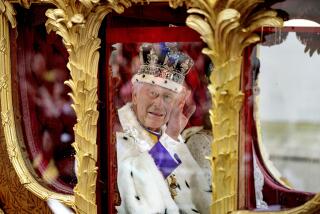BOOK REVIEW : The Storied Decline of British Aristocracy : ASPECTS OF ARISTOCRACY <i> by David Cannadine</i> ; Yale University Press; $30, 320 pages
- Share via
After David Cannadine’s “The Decline and Fall of the British Aristocracy,” a vintage work on the subject, his essays in this new book come more or less as bin-ends. The title is exact: They develop in detail a wide miscellany of subjects encompassed but not necessarily explored in the first book.
They range from a thorough account of the debts of the Dukes of Devonshire to the elaborate and purposeful ceremonials devised by the viceroy, Lord Curzon, in India. They include a seriocomic history of the explosive Baron Strickland of Sizergh, who managed--serially and sometimes simultaneously--to be a member of the House of Commons, a peer in the House of Lords, a political leader in Malta, and a colonial governor in the Leeward Islands and Tasmania. They include a sunny portrait of a family of gentry, a faintly rancorous list of the scandals attending Winston Churchill’s aristocratic relatives, and a sketchy account, whose rancor is not in the least faint, of Vita Sackville-West and Harold Nicolson.
The rancor comes from generally laudable exasperation. Cannadine is not exactly an iconoclast; the British aristocracy has long stopped producing icons of either the grand or villainous sort. What has enveloped it, over the past half-century, is a mushy, in part trans-Atlantic, sentimentality: the romance of country houses and a gracious way of life.
Cannadine, who writes in lively, dispassionate and fascinating detail about the shifting structures of power and wealth in an aristocracy that took longer than any other to decline, is attached to his subject, diverted by it, fair to it. But he can’t stand the mush.
Usually he is cool and only mildly ironic. But his war against the reverential sometimes carries him too far. His essay about Churchill’s relatives, the Marlboroughs and others, aims to place Winston in the context of an aristocratic tradition that has more to do with the rakehell antics of the Regency bucks than the tactful shabby tweediness of their successors.
This is one reason, he notes, that so much of the British upper class so passionately distrusted him up until the war. Fair enough. But in detailing the scandals and implying that Churchill himself was not free of them, Cannadine uses altogether too many “it was rumored” and “it was widely whispered.” He can sound like the Daily Mail--or the Times of London quoting the Daily Mail.
As for Vita and Harold, Cannadine is irked by their stylish legend and, particularly, by their son and biographer, Sir Nigel Nicolson, whom he calls the family “publicist, editor, apologist.” They were snobs and mediocrities, he argues.
True, in part, and in part patently untrue. Nicolson’s diaries and sketches may lack grandeur, but they do not lack greatness. Boswell was once underestimated in the same way Cannadine underestimates Nicolson: both were silly, snobbish and had no dignity. And both wrote of their worlds with unquenchable life.
Insisting that Nicolson’s homosexuality is a relatively minor issue, Cannadine writes that his first book was a study of Verlaine, “the French poet and degenerate.” Yes . . . as in Faulkner, the American novelist and lush, and Flaubert, the French writer and syphilitic, and. . . .
Apart from these two essays and one or two that are rather humdrum, Cannadine’s bin-ends include some splendid items.
Lord Curzon’s meticulous organization of the Durbar honoring the coronation of Edward VII included his choice of the books to be placed in the bookcases of each of the visiting dignitaries and his order to delete from “Onward Christian Soldiers” the stanza with the line about “Crowns and Thrones may perish.” The point of the grandeur was to make the Indian notables realize what a great thing it was to be part of the Empire. “Just as oratory was verbal advocacy, ritual was visual advocacy,” this early imperial spin-master wrote.
The story of Baron Strickland, half-Maltese and half-British by origin and about 200% British by conviction, would make a first-rate movie if Sir Alec Guinness were still available for such things.
Strickland was never quite accepted by either side; his vigorous pro-empire stance alienated the Maltese and embarrassed London. He had the sense, though, to marry into a powerful aristocratic family; his career was a succession of posts won by string-pulling (and obsessively devoted work) and lost by quarreling (and obsessively devoted work).
Cannadine has the art to assemble a suggestive portrait out of straightforward sentences and scholarly facts.
One of the best essays in the book seems simply to be a chronological account, yet it has the savor of evocation. It describes the rise of the Cozen-Hardy family from an 18th-Century Norfolk farm to the ownership of breweries and thousands of acres to several generations of lawyers, judges, editors and a barony; and then fading, in one case into a bed-and-breakfast establishment.
Scrupulous, gentle, civic-minded and connected by marriage to the leading families in the county--among them, the mustard Colmans--they represented what for most of this century many of the English would think of as England at her best.
More to Read
Sign up for our Book Club newsletter
Get the latest news, events and more from the Los Angeles Times Book Club, and help us get L.A. reading and talking.
You may occasionally receive promotional content from the Los Angeles Times.






